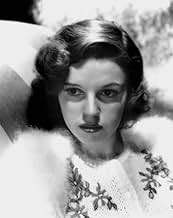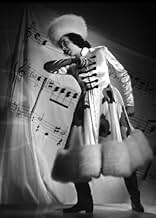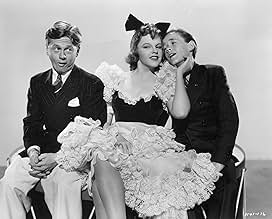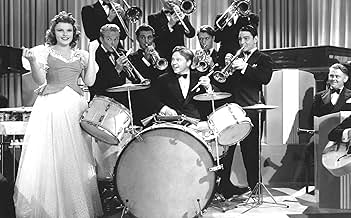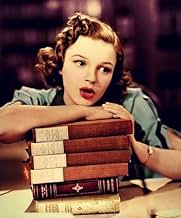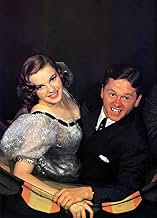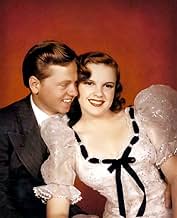IMDb रेटिंग
6.8/10
2.1 हज़ार
आपकी रेटिंग
अपनी भाषा में प्लॉट जोड़ेंA high school boy wants to become a professional musician, and his gal pal wants to become his best girl. They work together staging big band shows with fellow classmates in the hopes of hit... सभी पढ़ेंA high school boy wants to become a professional musician, and his gal pal wants to become his best girl. They work together staging big band shows with fellow classmates in the hopes of hitting it big.A high school boy wants to become a professional musician, and his gal pal wants to become his best girl. They work together staging big band shows with fellow classmates in the hopes of hitting it big.
- 1 ऑस्कर जीते
- 4 जीत और कुल 2 नामांकन
Jack Baxley
- Ice Cream Concessionaire
- (काटे गए सीन)
फ़ीचर्ड समीक्षाएं
10B&W-2
I can't help it, I love Mickey and Judy, and this is their best film together. It has fun songs ("Our Love Affair" and "Do the La Conga" especially), good Busby Berkeley productions (both the aforementioned, especially the fruit-as-orchestra dream sequence!), but more importantly, it perfectly evokes the ideal small middle-American town, complete with understanding mothers and principals, swell fellas and gals, and a comforting everything's going to be just fine feeling. I can't help yearning for this never-never land of rebellious but polite youths and understanding old-timers!
After the success of Babes In Arms for MGM, Arthur Freed became the hottest producer on the lot and was granted his own famous Freed Unit to produce the best of the MGM musicals for the next 20 years almost. According to Hugh Fordin's book on Arthur Freed the next scheduled property was Good News, but that got shelved for several years when Louis B. Mayer decided that a patriotic type theme was in order and after all MGM had bought the screen rights to the Gershwin musical Strike Up The Band. Freed agreed, but in the Hollywood tradition only the title and the title song were retained for the screen.
That was enough because the Mickey and Judy formula was by now established with Babes In Arms. Here the two are a pair of talented musical kids and Mickey is the drummer in his high school band. But he's got other things on his mind besides doing John Philip Sousa. Even Sousa did more than Sousa when he was leading a band. Mickey is filled with the new jive rhythms of the day and he'd like to use the other kids in the school orchestra to form a real band. He's got Garland in mind for the vocals and the object is to get an audition from Paul Whiteman.
Whiteman in his day may have appropriated for himself the title of King Of Jazz, but certainly no one did more to popularize the new American art form among white audiences. His orchestra was the training ground for many of later big band leaders. Leaders like Tommy and Jimmy Dorsey and Glenn Miller all who were sidemen with Whiteman and who kids like Mickey and Judy and the rest of the cast were listening to.
If Strike Up The Band isn't exactly let's put on a show, it still is let's put on a concert and Mickey and Judy do have some shtick to perform, their Gay Nineties spoof is quite good. Also the fantasy sequence of the 'fruit orchestra' doing Our Love Affair is also nicely done, it looks very much like Ray Harryhausen's claymation figures, but he wasn't involved with Strike Up The Band.
Strike Up The Band won one Academy Award for sound and was nominated for two others. Roger Edens and Arthur Freed wrote Our Love Affair which was nominated for Best Song, but lost to When You Wish Upon A Star. And Edens and Georgie Stoll were nominated for Best Musical Scoring.
Busby Berkeley directed the film and in the finale shows his fine hand for spectacle. Here's where the patriotism that Louis B. Mayer was seeking came out. Remember this was 1940 and a lot of people were very afraid the USA was going into another World War. The finale with the title song was the kind of rousing patriotic spectacle that Hollywood would be doing in every studio after December 7, 1941.
With Strike Up The Band Arthur Freed proved he was no flash in the pan as a producer. After 70 years the film holds up well and the talents of Mickey Rooney and Judy Garland reign eternal.
That was enough because the Mickey and Judy formula was by now established with Babes In Arms. Here the two are a pair of talented musical kids and Mickey is the drummer in his high school band. But he's got other things on his mind besides doing John Philip Sousa. Even Sousa did more than Sousa when he was leading a band. Mickey is filled with the new jive rhythms of the day and he'd like to use the other kids in the school orchestra to form a real band. He's got Garland in mind for the vocals and the object is to get an audition from Paul Whiteman.
Whiteman in his day may have appropriated for himself the title of King Of Jazz, but certainly no one did more to popularize the new American art form among white audiences. His orchestra was the training ground for many of later big band leaders. Leaders like Tommy and Jimmy Dorsey and Glenn Miller all who were sidemen with Whiteman and who kids like Mickey and Judy and the rest of the cast were listening to.
If Strike Up The Band isn't exactly let's put on a show, it still is let's put on a concert and Mickey and Judy do have some shtick to perform, their Gay Nineties spoof is quite good. Also the fantasy sequence of the 'fruit orchestra' doing Our Love Affair is also nicely done, it looks very much like Ray Harryhausen's claymation figures, but he wasn't involved with Strike Up The Band.
Strike Up The Band won one Academy Award for sound and was nominated for two others. Roger Edens and Arthur Freed wrote Our Love Affair which was nominated for Best Song, but lost to When You Wish Upon A Star. And Edens and Georgie Stoll were nominated for Best Musical Scoring.
Busby Berkeley directed the film and in the finale shows his fine hand for spectacle. Here's where the patriotism that Louis B. Mayer was seeking came out. Remember this was 1940 and a lot of people were very afraid the USA was going into another World War. The finale with the title song was the kind of rousing patriotic spectacle that Hollywood would be doing in every studio after December 7, 1941.
With Strike Up The Band Arthur Freed proved he was no flash in the pan as a producer. After 70 years the film holds up well and the talents of Mickey Rooney and Judy Garland reign eternal.
Overlong but fun Mickey & Judy "let's put on a show" musical, directed by the great Busby Berkeley. Drummer Jimmy (Mickey Rooney) and would-be girlfriend Mary (Judy Garland) try to make their high school band a success. Along the way they deal with little personal dramas like Jimmy's mother wanting him to be a doctor, a new girl in town who captures Jimmy's eye, and one of the band members needing an emergency operation. The musical numbers are good, if not particularly memorable. Mickey & Judy are terrific, as always. It's probably pretty corny stuff for those who aren't fans but, if you enjoy these types of movies, I'm sure you'll have a good time with this one.
It's another "let's put on a show!" movies starring Mickey Rooney and Judy Garland! I saw Strike Up the Band before Babes in Arms, and while I thought it was silly at the time, compared to the earlier flick, it's as epic as Gone With the Wind.
Mickey takes the lead as a high school student far more interested in his drum set than preparing to become a lawyer to fulfill his mother's dream. Judy's in love with him, but he doesn't care about girls, only music. A lowerclassman, Larry Nunn, is in love with Judy, and when June Preisser shows up batting her eyelashes at Mickey, it stars an extremely uninteresting love quadrangle. Mickey isn't really interested in June; he's just getting into the show's rehearsals. Judy isn't interested in Larry, even though he's clearly the better choice. Larry proposes marriage and promises to never go out with other girls, the same evening that Mickey's stood Judy up to go out with June. Larry's only thirteen and offers to wait until she's ready, and when she turns him down, it's heartbreaking to see his face. Why doesn't she just tell him to wait? By the time she's gotten Mickey out of her system, Larry will probably have grown up and gotten over his crush. No heartbreak necessary. Plus, compared to the disinterested, unreliable, pushover Mickey, Larry's a dream!
If you're going to watch this one, it's either because you love the silly Mickey-Judy movies or because you want to see another Busby Berkeley musical. Busby Berkeley movies have such a special feeling to them, that even though they're dated and the music isn't always great, you're going to see someone who put a lot of thought into his craft instead of just "Let's put on a show!" like the people in his movies. You'll get to see his classic angles and beautifully framed shots, but you might not like the rest of the movie. Both leads are in their super-hyper phases, and since we know what we know about how old Hollywood fed the kids drugs to give them pep, it's not really too much fun to see them bouncing off the walls. "Who's been feeding you vitamins?" Judy jokes when Mickey approaches her with particularly intense energy. It's just not funny to hear her say that, since everyone knows they weren't really vitamins. There's just so much energy a person can put into the conga line before someone notices he's not really normal.
Mickey takes the lead as a high school student far more interested in his drum set than preparing to become a lawyer to fulfill his mother's dream. Judy's in love with him, but he doesn't care about girls, only music. A lowerclassman, Larry Nunn, is in love with Judy, and when June Preisser shows up batting her eyelashes at Mickey, it stars an extremely uninteresting love quadrangle. Mickey isn't really interested in June; he's just getting into the show's rehearsals. Judy isn't interested in Larry, even though he's clearly the better choice. Larry proposes marriage and promises to never go out with other girls, the same evening that Mickey's stood Judy up to go out with June. Larry's only thirteen and offers to wait until she's ready, and when she turns him down, it's heartbreaking to see his face. Why doesn't she just tell him to wait? By the time she's gotten Mickey out of her system, Larry will probably have grown up and gotten over his crush. No heartbreak necessary. Plus, compared to the disinterested, unreliable, pushover Mickey, Larry's a dream!
If you're going to watch this one, it's either because you love the silly Mickey-Judy movies or because you want to see another Busby Berkeley musical. Busby Berkeley movies have such a special feeling to them, that even though they're dated and the music isn't always great, you're going to see someone who put a lot of thought into his craft instead of just "Let's put on a show!" like the people in his movies. You'll get to see his classic angles and beautifully framed shots, but you might not like the rest of the movie. Both leads are in their super-hyper phases, and since we know what we know about how old Hollywood fed the kids drugs to give them pep, it's not really too much fun to see them bouncing off the walls. "Who's been feeding you vitamins?" Judy jokes when Mickey approaches her with particularly intense energy. It's just not funny to hear her say that, since everyone knows they weren't really vitamins. There's just so much energy a person can put into the conga line before someone notices he's not really normal.
No I don't care what anybody says Mickey Rooney and Judy Garland were excellent miss film both young actors at the time and the singing and the music was superb. Yeah I mean it was a film on a 1940 remember that! But I loved Judy Garland and always will
क्या आपको पता है
- ट्रिवियाThe original camera negative was destroyed in May 1978 during a nitrate film fire in the George Eastman House archives. The fire also destroyed 328 other films' original camera negatives.
- गूफ़In an anachronism typical of movie musicals of the time, when Mickey and Judy's band wins the competition, it is announced that musicians, singers and dancers from the various competing orchestras will perform an impromptu big number together. Even though they've never met before, nor rehearsed, nor had even five minutes to create sets and costumes, everything comes off seamlessly and with M-G-M's usual level of polish.
- भाव
Paul Whiteman: Take that little fellow on the street. Teach him to blow a horn and he'll never blow a safe.
- कनेक्शनEdited into Hollywood: The Dream Factory (1972)
- साउंडट्रैकStrike Up the Band
(1927)
Music by George Gershwin
Lyrics by Ira Gershwin
Played during the opening credits
Sung by Judy Garland (uncredited), Mickey Rooney (uncredited), and chorus in the finale
टॉप पसंद
रेटिंग देने के लिए साइन-इन करें और वैयक्तिकृत सुझावों के लिए वॉचलिस्ट करें
Everything New on HBO Max in June
Everything New on HBO Max in June
Looking for something different to add to your Watchlist? Take a peek at what movies and TV shows are coming to HBO Max this month.
- How long is Strike Up the Band?Alexa द्वारा संचालित
विवरण
- रिलीज़ की तारीख़
- कंट्री ऑफ़ ओरिजिन
- भाषा
- इस रूप में भी जाना जाता है
- Armonías de juventud
- फ़िल्माने की जगहें
- उत्पादन कंपनी
- IMDbPro पर और कंपनी क्रेडिट देखें
बॉक्स ऑफ़िस
- बजट
- $8,38,661(अनुमानित)
- चलने की अवधि2 घंटे
- रंग
- पक्ष अनुपात
- 1.37 : 1
इस पेज में योगदान दें
किसी बदलाव का सुझाव दें या अनुपलब्ध कॉन्टेंट जोड़ें



